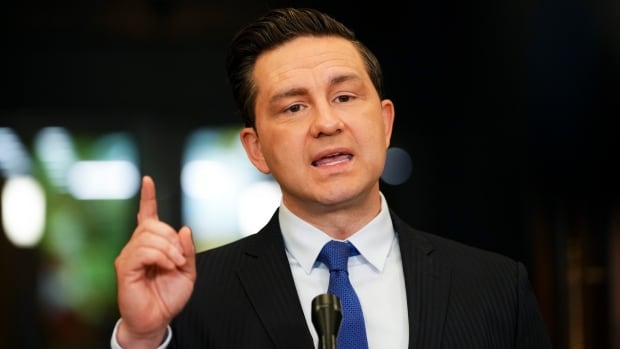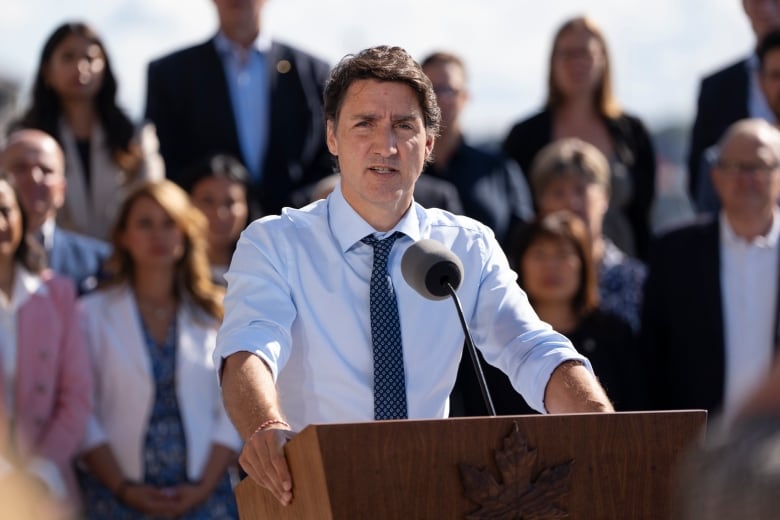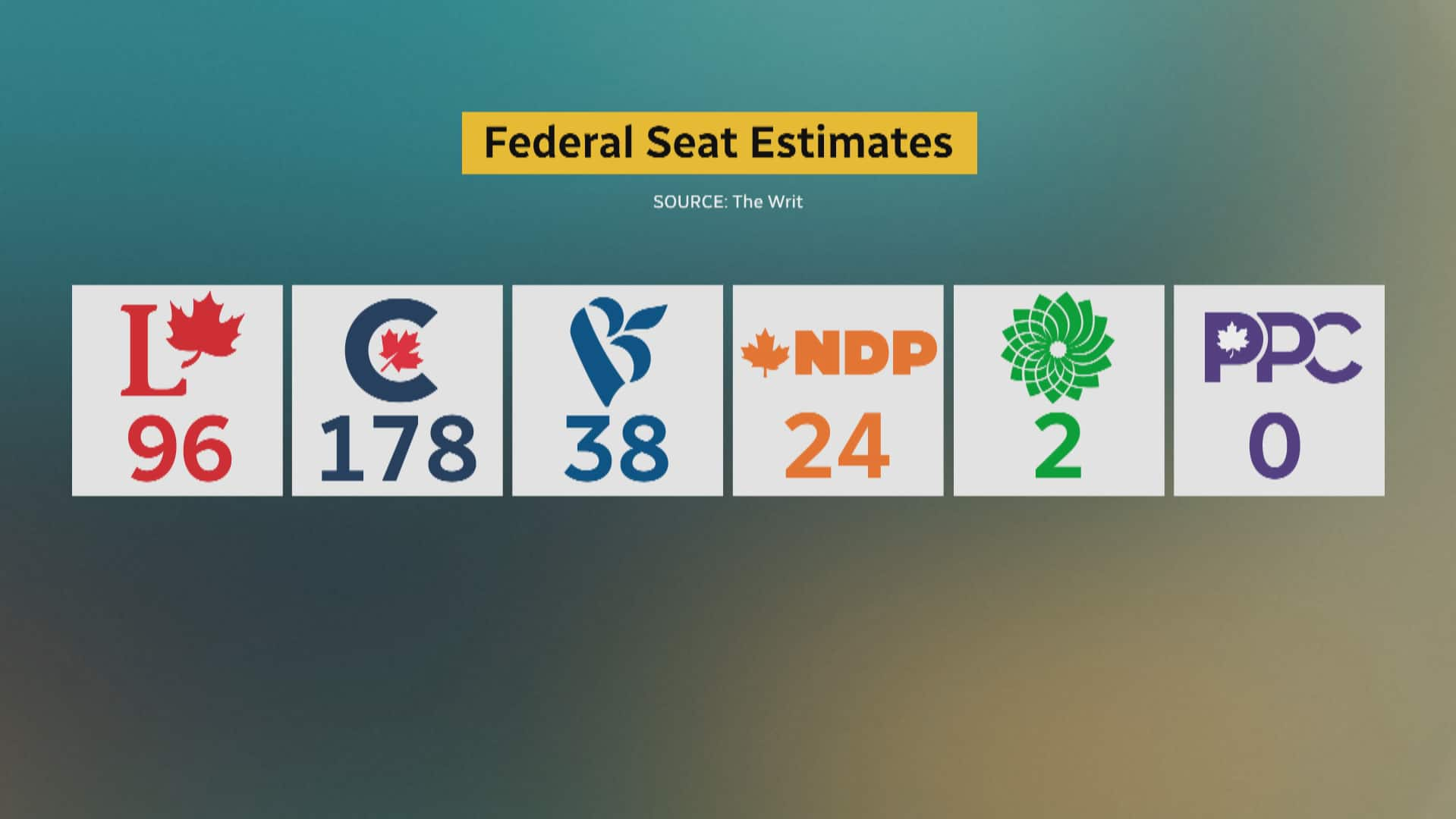
Conservative party members will assemble in Quebec City starting Thursday for a three-day policy convention — a chance to craft a playbook to woo voters who are showing signs of fatigue with the governing Liberals.
Conservative Leader Pierre Poilievre has seen his fortunes improve over the summer months with the party registering higher support in public opinion polls — figures that suggest the party could form a majority government if the next election were held any time soon.
Poilievre is laser-focused on affordability, inflation and the government’s perceived failings but some party members have other issues on their mind.
The list of policy proposals before delegates this weekend includes some ideas to address the crippling increase in the cost of living, including providing different mortgage terms so homebuyers can lock in at lower rates for longer, and changes to the RRSP withdrawal rules for seniors.
But the document also reveals some members are eager to engage in so-called culture wars topics.
There are pitches on upending transgender-related policies, limiting euthanasia, doing away with forced diversity training, scrapping vaccine mandates for good and dismantling the Emergencies Act, the legislation used to dismantle the 2022 COVID-19 convoy.
The policies were crafted by the party’s grassroots and approved by local electoral district associations (EDAs) before making it to this convention. There will be further debate before a final vote on the new policies on Saturday.
The policies are designed to inform the party’s next election platform but Poilievre isn’t required to campaign on what delegates endorse.
Recent polling suggests the Conservatives have a clear path to a majority government in an election held in the near future. The Writ’s Éric Grenier breaks down the latest numbers. Then, Conservative Party of Canada president Rob Batherson discusses the hot button policy proposals on the convention agenda.
These conventions have been a headache for past leaders.
At the 2021 policy convention, Poilievre’s predecessor, Erin O’Toole, promised action on the environment in a speech. The very next day, party delegates rejected a motion that declared climate change is real. As a result, O’Toole left the convention weakened with rampant internal discontent.
The challenge for Poilievre, party insiders and observers tell CBC News, is keeping members focused on the main task before them: cobbling together a winning coalition that can take down Prime Minister Justin Trudeau and end eight years of Liberal rule.
The party can’t be distracted by social issues that could be off-putting to swing voters, the insiders said.
A policy to ban sex-selective abortions — a long-time demand of some anti-abortion activists in the party — was initially included in the list of policy proposals but was ultimately dumped from the final 55 that delegates will debate this week.
It’s a sign that the Poilievre-led party doesn’t want to be consumed by at least one divisive social issue.

Speaking to reporters Wednesday, Poilievre steered clear of the more controversial proposals when asked which ones he’s prepared to endorse.
“I’d rather let the members review the motions and propose what policy they want me to consider and when they do, I’ll consider it,” Poilievre said.
“Leaders of course are never bound by convention resolutions but we do take them into consideration,” he said.
A Conservative source close to Poilievre who spoke to CBC News on background said the party brass isn’t as concerned about the inevitable Liberal attacks over Tory social policy — attacks that tripped up past leaders like Andrew Scheer and O’Toole.
In 2019, for example, Liberals raised Scheer’s past opposition to same-sex marriage. In the 2021, Trudeau hammered O’Toole for his more permissive stance on firearms while also suggesting the abortion debate could be reopened with the Tories in power.
Poilievre was clear during the leadership election that a government led by him won’t introduce any new abortion legislation, the source said, and some more moderate voters are also uneasy about the pace of change with trans and gender issues.
“Pierre is adept at swatting away Liberal fear-mongering,” the source said.
“Plus, some voters are tired of all the ‘woke’ talk that comes from this Liberal government. We’re fine having some of these conversations,” the source said.
Canadians want change, says Tory party president
Rob Batherson, the Conservative party president, said the party is bracing for the Liberals to rely on the “usual fear and scare tactics” to weaken Poilievre’s standing among more moderate voters.
With Trudeau on the defensive, the Tories are expecting their opponent to go negative, he said.
“I think Canadians will see through those tactics and they’ll focus on the fact that everything has gotten appreciably worse over the last eight years,” Batherson said in an interview with CBC’s Power & Politics.
“We’re increasingly confident that Canadians are looking for a change in government, and they’re certainly tired of Justin Trudeau,” he said.

Among the socially conservative policies that delegates will consider in Quebec is a proposed ban on gender-affirming care for minors.
The proposal, backed by delegates from the B.C. riding of North Okanagan-Shuswap, is designed to “protect children” by “prohibiting life altering medicinal or surgical interventions on minors under 18 to treat gender confusion or dysphoria.” The policy mimics similar policies enacted by conservative Republican governments in the U.S.
For many social conservatives, trans issues have supplanted abortion as the top issue.
In that vein, there’s also a proposal from the Alberta riding of Edmonton Strathcona that would make it party policy to demand “women-only spaces,” to ensure that women have “safety, dignity and privacy” in places like prisons, shelters, locker rooms and washrooms.
They also want “women-only” categories in sports and for scholarships — a proposal that’s designed to exclude transgender women. Under the policy, a woman would be defined as a “female person” in the Conservative constitution.
Proposal aims to promote ‘bodily autonomy’
This push follows the lead of some U.S. states that have enacted similar policies after transgender swimmer Lia Thomas won a women’s NCAA national championship. That victory ignited a political debate about the acceptability of trans athletes in elite sport.
Delegates from Edmonton Strathcona also want to do away with “forced political, cultural or ideological training of any kind” that is a “precondition of employment or practice,” an apparent reference to diversity training in some workplaces.
While some delegates are eager to restrict the rights of trans people, others want to promote “bodily autonomy.”
Delegates from the Quebec riding of Repentigny say people should have more say in what goes into their bodies — a policy borne out of opposition to Ottawa’s past policy of requiring certain public servants get a COVID-19 shot or face potential job loss.
“Health professionals must disclose an uncensored risk benefit analysis for any treatment (including vaccines) while protecting patient privacy. No constitutional right shall be restricted for refusing medical treatments,” the policy proposal reads.
As for medical assistance in dying (MAID) a proposal from delegates from the Ontario riding of Thunder Bay—Superior North, which describes the practice as “euthanasia,” aims to roll back what’s currently on offer.
They want the practice stopped for people who are not terminally ill. And they want a ban on the service for people who have mental health issues.
J.P. Lewis is a professor of political science at the University of New Brunswick Saint John and the author of The Blueprint: Conservative parties and their impact on Canadian politics.
Lewis said the convention is a delicate balancing act for the leader. Poilievre can’t be seen as marginalizing the grassroots by denying talk on hot topics.
He also can’t get caught up in fractious debates that don’t play well in a general election.
“These conventions are a real test for a leader. But Poilievre has more room to fail. He’s had a consistent lead over Trudeau in the polls. He’s got such momentum because there’s a tremendous amount of voter fatigue out there.
“Fatigue — that’s a powerful force in Canadian politics,” he said in an interview.
